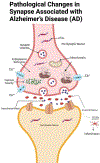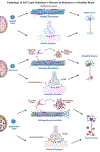Overlooked cases of mild cognitive impairment: Implications to early Alzheimer's disease
- PMID: 38744405
- PMCID: PMC11180381
- DOI: 10.1016/j.arr.2024.102335
Overlooked cases of mild cognitive impairment: Implications to early Alzheimer's disease
Abstract
Mild cognitive impairment (MCI) marks the initial phase of memory decline or other cognitive functions like language or spatial perception, while individuals typically retain the capacity to carry out everyday tasks independently. Our comprehensive article investigates the intricate landscape of cognitive disorders, focusing on MCI and Alzheimer's disease (AD) and Alzheimer's disease-related dementias (ADRD). The study aims to understand the signs of MCI, early Alzheimer's disease, and healthy brain aging while assessing factors influencing disease progression, pathology development and susceptibility. A systematic literature review of over 100 articles was conducted, emphasizing MCI, AD and ADRD within the elderly populations. The synthesis of results reveals significant findings regarding ethnicity, gender, lifestyle, comorbidities, and diagnostic tools. Ethnicity was found to influence MCI prevalence, with disparities observed across diverse populations. Gender differences were evident in cognitive performance and decline, highlighting the need for personalized management strategies. Lifestyle factors and comorbidities were identified as crucial influencers of cognitive health. Regarding diagnostic tools, the Montreal Cognitive Assessment (MoCA) emerged as superior to the Mini-Mental State Examination (MMSE) in early MCI detection. Overall, our article provides insights into the multifaceted nature of cognitive disorders, emphasizing the importance of tailored interventions and comprehensive assessment strategies for effective cognitive health management.
Keywords: Cognitive disorders; Early detection; Healthy brain aging; Intervention strategies; Mild Cognitive Impairment (MCI).
Copyright © 2024 Elsevier B.V. All rights reserved.
Conflict of interest statement
Declaration of Competing Interest The authors declare that they have no known competing financial interests or personal relationships that could have appeared to influence the work reported in this paper
Figures




References
-
- Arevalo-Rodriguez I, Smailagic N, Roqué-Figuls M, Ciapponi A, Sanchez-Perez E, Giannakou A, Pedraza OL, Cosp XB, Cullum S, 2021. Mini-Mental State Examination (MMSE) for the early detection of dementia in people with mild cognitive impairment (MCI). Cochrane Database of Systematic Reviews. - PMC - PubMed
-
- Beinhoff U, Tumani H, Brettschneider J, Bittner D, Riepe MW, 2008. Gender-specificities in Alzheimer’s disease and mild cognitive impairment. Journal of neurology 255, 117–122. - PubMed
Publication types
MeSH terms
Grants and funding
LinkOut - more resources
Full Text Sources
Medical

